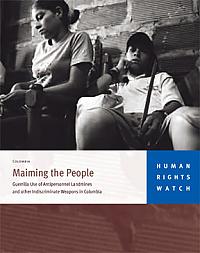Poland’s announcement on December 5, 2012, that it is about to ratify the international treaty prohibiting landmines means that all 27 European Union countries have banned these unlawful weapons, Human Rights Watch said today. During the 12th annual meeting of the Mine Ban Treaty, which ended in Geneva today, the United States announced that it will “soon” make a decision on joining the treaty.
“With Poland’s ratification the EU can finally speak with one voice in opposing antipersonnel landmines,” said Steve Goose, arms director at Human Rights Watch. “The United States should realize that this not the time for half-measures; there is no alternative but to embrace the Mine Ban Treaty.”
A total of 160 nations are party to the Mine Ban Treaty, which comprehensively prohibits antipersonnel landmines and requires their clearance and assistance to victims. At the treaty’s meeting this week, Poland’s deputy foreign minister announced that its president has signed the country’s ratification instrument for the Mine Ban Treaty, which will be deposited at the United Nations shortly. With Poland’s ratification all European Union member states will have joined the treaty, just days before the EU is slated to receive the Nobel Peace Prize.
At the Geneva meeting, the US delegation announced that the landmine policy review initiated in late 2009 will conclude “soon,” but it did not indicate more precisely when the decision would be made. The United States and 35 other countries have not joined the Mine Ban Treaty, which was opened for signature in December 1997 and entered into force on March 1, 1999. Nearly all non-signatories, including the US, follow the treaty’s key provisions and have not used, produced, or exported antipersonnel mines in many years. The last recorded use of antipersonnel landmines by the US was more than 20 years ago, during the 1991 Gulf War.
In the past couple of years antipersonnel landmines have been used by Syria, Burma, Israel, and Libya, none of which have joined the Mine Ban Treaty. In 2012, there have been serious allegations of antipersonnel mine use by the armed forces of Sudan and Yemen, both Mine Ban Treaty states parties, though neither government appears to have initiated an investigation into the allegations. A small number of rebel groups also continue to use antipersonnel mines.
“All countries that care about protecting civilians need to speak out against new use of antipersonnel landmines to help stigmatize these weapons,” Goose said. “Reports and allegations of new antipersonnel mine use should be investigated promptly, especially when treaty members are involved.”
All countries should condemn new landmine use and tackle possible breaches to preserve the Mine Ban Treaty’s strength and integrity, Human Rights Watch said.
A total of 116 countries participated in the Mine Ban Treaty’s Twelfth Meeting of States Parties, held in Geneva from December 3 through 7. Observer delegations participated from 17 countries that have not joined the treaty, including Burma, China, India, Laos, Lebanon, Libya, Oman, Palestine, Singapore, and the United States.
At the meeting, five member countries – Republic of Congo, Denmark, Guinea-Bissau, Jordan, and Uganda – announced the completion of their mine clearance programs. This brings the total number of states that have completed mine clearance and become mine-free to 24, in addition to non-signatory Nepal. At the meeting, Palestine declared its strong desire to join the Mine Ban Treaty as soon as possible.
Three member countries – Belarus, Greece, and Ukraine – have remained in violation of the treaty for several years, having missed their deadlines for destroying stockpiled antipersonnel mines. However, all three reported at the meeting that they have made progress.
Human Rights Watch is a founding member of the International Campaign to Ban Landmines (ICBL), which received the 1997 Nobel Peace Prize together with its coordinator Jody Williams, for its efforts to bring about the Mine Ban Treaty and for its contributions to a new international diplomacy based on humanitarian imperatives.
To read more Human Rights Watch reporting on landmines, please visit:
http://www.hrw.org/en/category/topic/arms/landmines
For additional background on landmines, please see:
International Campaign to Ban Landmines: http://www.icbl.org/






